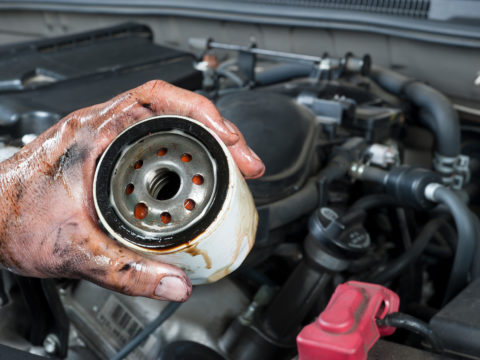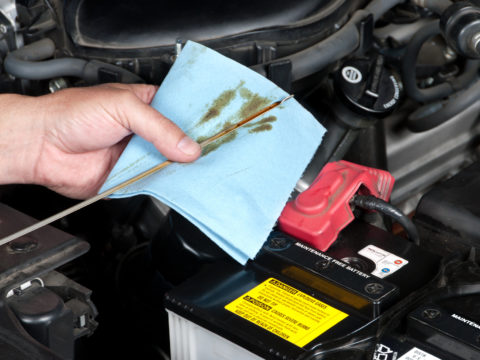The Society of Automotive Engineers (SAE) created a numerical coding system that is used to grade an oil’s viscosity levels at different temperatures.
The viscosity of an oil is the measurement of flow resistance when it goes through an engine at different temperatures. Continue reading to learn everything you will ever need to know about oil designated as 15W-40.

Contents
What Does 15W-40 Oil Mean?
SAE designates 15W-40 as a multi-grade oil you can use at all temperatures because the oil is both thin enough to flow through engines during cold weather and thick enough to flow through engines during hot weather.
Who Makes 15W-40 Oil?
The following ten popular companies sell 15W-40 oil:
- Advantage
- Chevron
- Cummins
- Ford Motorcraft
- Lucas
- Mobil
- Napa
- Shell
- STP
- Valvoline
What Is 15W-40 Oil Used For?
15W-40 is extremely popular because you can use it for many types of vehicles and equipment.
The following vehicle and equipment types can safely use 15W-40 equipment:
- Over-the-road Trucks
- Off-highway Diesel Equipment
- Farm Tractors
- Diesel Passenger Cars
- Diesel Light Trucks
- Turbo-charged Diesel Engines
- Gasoline Engines (In Specific Circumstances)
Is 15W-40 Oil Only for Diesel Engines?
The most important step when choosing an oil for your vehicle is following the manufacturer’s specifications and viscosity requirements. You can cause yourself a lot of costly repair bills and will lower the overall life of your vehicle or equipment if its manufacturer did not specify a gasoline engine to use 15-W40 oil.
Manufacturers recommend 15W-40 oil for diesel engines because most modern diesel engines use direct-inject designs and are turbo-charged.
This means that a diesel engine will collect carbon much quicker and will compress a larger amount of air, respectively. 15W-40 also has additional additives meant specifically for diesel engines that are unnecessary for gasoline engines.
Detergents are used to help keep diesel engines clean of gunk build-up, soot, and other by-products created during normal use. Gasoline engines do not create these types of byproducts and the detergents can have a reverse reaction to your engine, which will cause damage.
Notable Features of the 15W-40 Oil
Overall Performance
The oil in your vehicle leaves a thin residue on the various parts of your engine when pumped through. This residue helps lubricate all the moving parts in your engine, allowing them to operate properly. The viscosity rating of the oil you use affects how well and how quickly this lubricating process happens during specific temperatures.
Another important function of oil is to help clean the engine parts clean from sludge and deposits, protect engine parts from corroding, and lower emissions. These result in extending the life of your engine.
15W-40 oil is extremely popular because of its ability to be used year-round with many vehicles and equipment. It has a shorter than average change requirement and doesn’t start as well in colder temperatures because of its viscosity causing extra cranks.
Composition
The composition of 15W-40 contains the following components:
- Alkaryl Amine
- Calcium Sulphonate
- Alkyl Borate
- Dialkyl Alkaryl Aminomethyl Dicarboxylate
- Alcohol, Ethoxylated
- Interchangeable Low Viscosity Base Oil
Semi-synthetic or full-synthetic oils do not use crude oil like conventional oils. They produce synthetic oils in a lab using other products. Be sure to check out the oil manufacturer’s website if you have questions about the use of synthetic oil and if your engine would benefit from using them.
Viscosity
Temperature, pressure, and engine speed are the three things that affect the viscosity of the oil.
The measurement of oil’s resistance to flowing through an engine at different temperatures is what the primary SAE rating measures.
An oil’s thickness and flow resistance all depend on the temperature it is being used in. 15W-40 has a higher viscosity when cold and a lower viscosity when hot. This is a fancy way of saying the oil will be thicker in cold temperatures and thinner in hot temperatures.
Pressure is pretty constant as it is the atmospheric pressure that is measured. Oil pressure is measured in pound-force per square inch PSI). The most common PSI levels are 25-65 PSI. If you are maintaining your oil, you will want to follow the manufacturer’s specifications for the proper PSI levels for your vehicle.
SAE measures speed using specific variables call Cold Cranking Viscosity (CCV), Shear Stability, and High-Temperature High Shear (HTHS) viscosity.
CCV simulates oil’s viscosity when you attempt to start your car in cold temperatures. Shear Stability simulates the lifespan of oil during specific scenarios. High-Temperature High Shear simulates oil’s viscosity when it is run through the engine at hot temperatures.
Operating Temperature Range
The 15 rating is the oil’s viscosity rating at colder temperatures no lower than -25 degrees Celsius (-13 degrees Fahrenheit). The W means winter and designates its ability to be used during colder seasons.
The 40 rating is the oil’s viscosity rating at warmer temperatures no higher than 100 degrees Celsius (212 degrees Fahrenheit). You should change 15W-40 oil after 5000 kilometers (3500 miles) or every three months, whichever comes first.
15W-40 is not recommended if you live or work in an area with colder or hotter than average temperatures. Manufacturers also do not recommend 15W-40 oil if you live in an area where extreme weather lasts longer than normal seasons.
Mileage
The most common recommendation by diesel experts is changing your vehicle’s oil after 5000 kilometers (3500 miles) or every three months, whichever comes first.
Other factors that will determine the mileage you receive in between oil changes are usage and oil type. Usage can be defined as the temperature, type of driving, and amount of driving of your vehicles or equipment during use. Synthetic oil also lasts a lot longer compared to conventional oil, so you can usually go longer between changes.
The above are common recommendations, but you will still want to follow the specifications of your vehicle’s manufacturer for oil changes.
Average Price per Quart
The average price for a quart of 15W-40 oil is $4.99. Though this oil typically comes in a one-gallon container.

15W-40 Oil Pros and Cons
Like every product, there are some pros and cons that come along with 15W-40 oil.
15W-40 Oil Pros
You can use 15W-40 oil during both the winter and summer months since it is multi-grade. The SAE rates 15W-40 oil to be used across your fleets and other diesel-based equipment, which saves you the hassle and costs of using a mixture of products. 15W-40 oil works extremely well with older engines and will extend their life even longer.
15W-40 Oil Cons
15W-40 oil requires a shorter change time compared to other oils. Manufacturers recommend you change it every 5,000 km (3500 miles). 15W-40 oil isn’t as efficient as lower-rated viscosity oils like 5W-30 with cold starts as it requires more cranks.
Best 15W-40 Diesel Oil
Shell Rotella T6 Diesel Engine Oil HD Full Synthetic 15W-40 1 Gal
$31.99 – Shell Rotella T6 Diesel Engine is a full synthetic formula that provides improved performance compared to standard and semi-synthetic oil.
It provides improved cold cranking properties and improved pumpability at lower temperatures. Shell’s full synthetic offering is almost double the cost of Shell’s conventional and synthetic blends, but the benefits far outweigh the additional costs.
Valvoline Premium Blue Diesel Engine Oil HD Conventional 15W-40 1 Gal
$19.99 – The Cummins Engine Company endorses Valvoline Premium Blue Diesel so you can trust it for your vehicle. Cummins recommends you use this oil with Dodge Ram Turbo Diesels as it is CES 20081 specification approved.
It also offers a one-of-a-kind dispersive polymer technology with high-level group 2 base oil. This provides even more soot control and prevents issues that may happen with cold starts.
Mobil Delvac 1300 Super Diesel Engine Oil HD Conventional 15W-40 1 Gal
$19.99 – Mobil Delvac 1300 is a synthetic blend that meets API CK-4 requirements. This oil is biodiesel compatible, and you can use it with many types of industries, including heavy-duty applications, construction, agriculture, trucking, and marine. It can be used with both older engines and newer engines with API requirements.
Chevron Delo 400 SDE Diesel Engine Oil HD Conventional 15W-40 1 Gal
$23.99 – Chevron Delo 400 is a mixed fleet oil meant for four-stroke diesel engines, turbo-charged, and electronically controlled engines. It provides proven protection against soot and engine wear for all parts of your engine. This oil also comes with a warranty guarantee that provides you with bumper-to-bumper protection for any lubricant-related issues.
STP Diesel Engine Oil Conventional 15W-40 1 Gal
$13.99 – STP Diesel Engine Oil meets OEM and API CK-4 specifications. You can also use it for CJ-4, CI-4, CI-4+, and CH-4. You can use this oil with gasoline engines and mixed fleets as it carries the API SN classification. STP Diesel Engine Oil provides excellent oxidation stability and oil use control compared to other brands.
15W-40 Oil Equivalent
You have a couple of different options when looking for the equivalent of 15W-40 oil. Instead of conventional oil, you can go with a semi-synthetic or a full synthetic-based oil.
Synthetic oils will provide improved lubrication and breakdown resistance because of the chemical process used when creating them. The molecules are more uniform, which results in better lubrication. This will increase the time in between oil changes.
You can also go with a lower-rated viscosity oil that will provide better performance in colder temperatures. For instance, 5W-40 can be used in temperatures that regularly get below zero degrees. Another benefit of 5W-40 oil must change it every 15,000 km (9000 miles).
Is 15W-40 Oil Worth It?
15W-40 oil is worth buying in the right conditions. This is the best oil you can use if you drive your vehicle in a wide variety of temperatures throughout the year. If you have a fleet of diesel trucks or run a lot of off-highway equipment, it is also worth it because you can use 15W-40 for everything.
Once you’ve determined to use 15W-40 oil, you will need to decide if you want to buy conventional, semi-synthetic, or full synthetic as that adds additional cost.
Where to Buy 15W-40 Oil
You can buy 15W-40 oil at most auto parts stores like AutoZone, big-box stores like Walmart, on the oil manufacturer’s website, and other online marketplaces like Amazon.
If you are looking to get 15W-40 oil for your business, most oil manufacturers ask that you contact them directly as they offer additional services outside of consumer sales.














